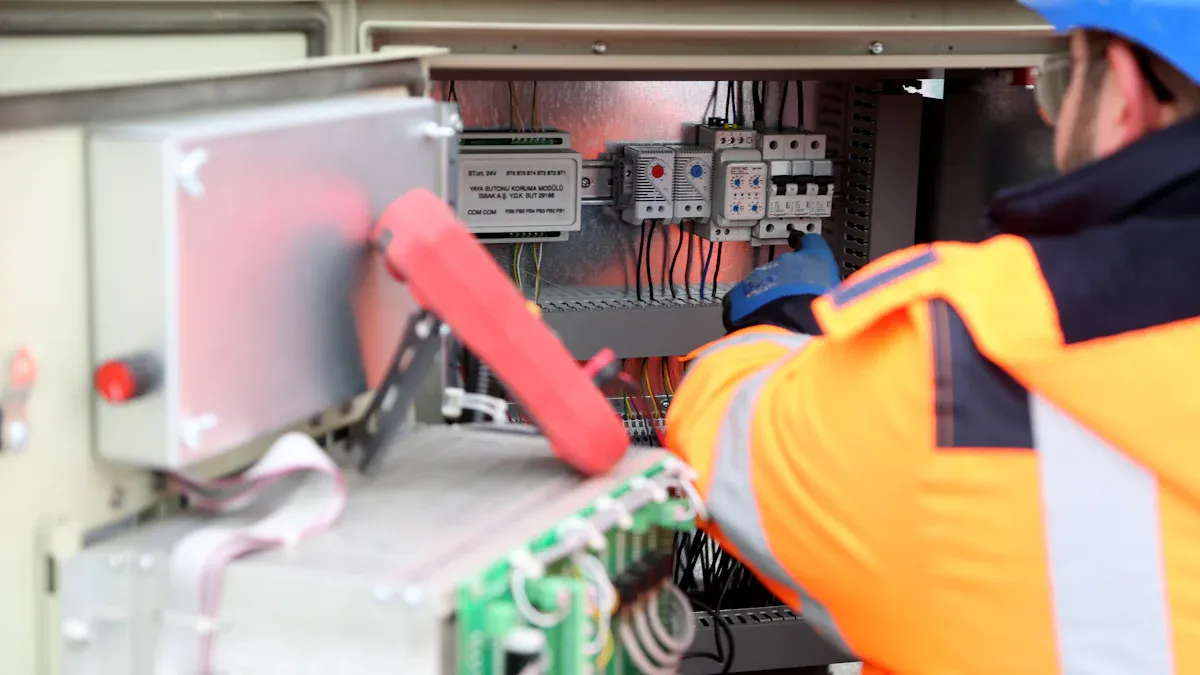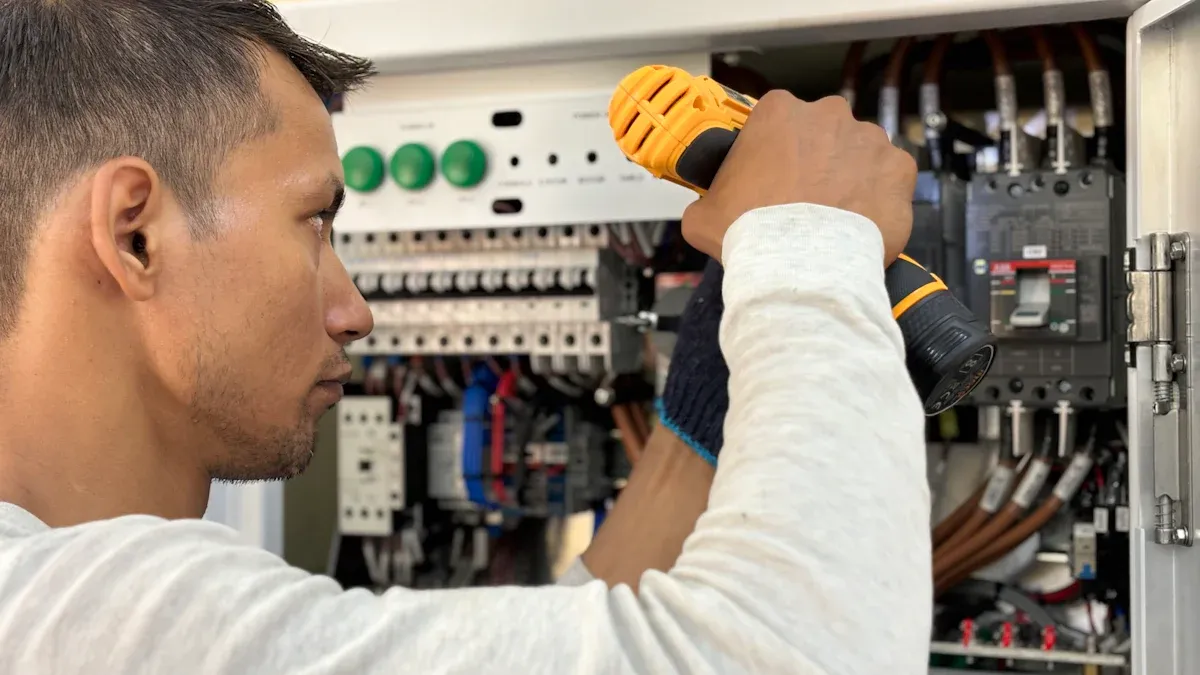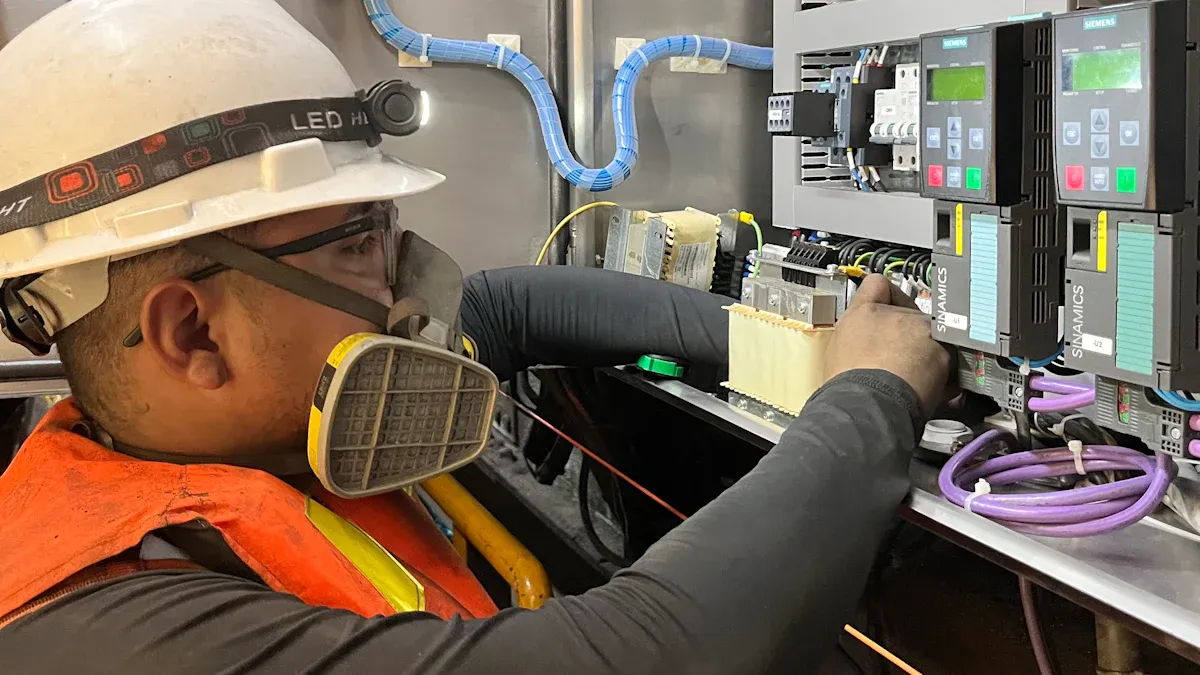
For Taiwan importers of Power Distribution Units, CE certification is of significant importance. This certification guarantees adherence to European safety and performance standards, which are globally respected. Products such as a Basic PDU, an Intelligent PDU, or the 19” Lockable IEC C13 C19 Rack Power Distribution Unit benefit from broader market access and compliance with strict regulatory requirements through CE certification.
Key Takeaways
- CE certification is important for Taiwan importers selling in Europe. It shows products meet EU safety and performance rules.
- UL 60950 certification boosts trust in North America. It ensures IT equipment is safe, which is key for data centers.
- Importers should get both certifications. Having both opens more markets and proves focus on safety and quality.
Understanding UL 60950 Certification

Purpose and Scope
UL 60950 certification focuses on the safety of information technology equipment, including devices like servers, routers, and power distribution units. Its primary goal is to ensure that these products meet stringent safety standards to protect users from electrical hazards, fire risks, and mechanical failures. The certification evaluates various aspects, such as insulation, grounding, and temperature control, to confirm that the equipment operates safely under normal and abnormal conditions. Manufacturers seeking UL 60950 certification must undergo rigorous testing and comply with detailed technical requirements. This certification is widely recognized as a benchmark for safety and reliability in the electronics industry.
Relevance for Power Distribution Units
Power distribution units play a critical role in managing and distributing electrical power in data centers and other facilities. UL 60950 certification is particularly relevant for these devices because it ensures compliance with safety standards that are crucial for high-performance environments. According to industry statistics, approximately 70% of data center operators prioritize compliance with certifications like UL 60950 when selecting vendors. This trend reflects the growing demand for energy-efficient and sustainable products. Organizations increasingly prefer certified PDUs to enhance operational safety and meet regulatory requirements. Compliance with UL 60950 not only boosts product credibility but also facilitates market entry by meeting customer expectations.
| Evidence Description | Key Insight |
|---|---|
| Approximately 70% of data center operators emphasize compliance with industry standards as a decisive factor in vendor selection. | This highlights the critical importance of UL 60950 certification in influencing purchasing decisions in the market. |
| The demand for compliant products is evident in the growing focus on energy efficiency and sustainability across industries. | Organizations prioritize energy-efficient PDUs with certifications, indicating a market trend towards UL 60950 compliance. |
| Safety certifications and regulatory compliance are critical factors influencing the PDU market. | Compliance with UL 60950 enhances product credibility and is often a prerequisite for market entry. |
Geographic Applicability
UL 60950 certification is primarily applicable in North America, where it is considered a standard requirement for electronic equipment. However, its influence extends beyond this region due to its global recognition. Many international markets, including Asia and Europe, accept UL-certified products as a mark of quality and safety. For Taiwan-based importers, UL 60950 certification can open doors to North American markets and enhance the appeal of their products in other regions. This certification serves as a valuable asset for businesses aiming to establish a strong presence in competitive global markets.
Understanding CE Certification
Purpose and Scope
CE certification signifies compliance with European Union (EU) directives and regulations. It ensures that products meet essential health, safety, and environmental protection standards. Manufacturers affix the CE mark to indicate that their products conform to these requirements. This certification applies to a wide range of products, including electrical equipment, machinery, and medical devices. For electrical devices, CE certification evaluates factors such as electromagnetic compatibility (EMC), low voltage safety, and energy efficiency. By obtaining CE certification, manufacturers demonstrate their commitment to producing safe and reliable products that align with EU standards.
Relevance for Power Distribution Units
Power Distribution Units (PDUs) must adhere to CE certification requirements to access European markets. This certification ensures that PDUs meet stringent safety and performance standards, reducing risks associated with electrical hazards. Certified PDUs undergo rigorous testing to verify their compliance with EMC and low voltage directives. These evaluations confirm that the units operate safely without interfering with other electronic devices. For businesses importing PDUs into Taiwan, CE certification enhances product credibility and aligns with global safety expectations. It also assures customers of the product’s reliability and adherence to international standards.
Geographic Applicability
CE certification is mandatory for products sold within the European Economic Area (EEA). However, its influence extends beyond Europe. Many countries outside the EU recognize CE certification as a mark of quality and safety. For Taiwan-based importers, this certification facilitates access to European markets and strengthens their competitive position globally. Products bearing the CE mark often gain preference in international markets due to their compliance with recognized safety and performance benchmarks.
Comparing UL 60950 and CE Certification
Compliance Requirements
UL 60950 and CE certification differ significantly in their compliance requirements. UL 60950 focuses on ensuring the safety of electronic equipment, particularly in high-demand environments like data centers. It evaluates factors such as electrical insulation, grounding, and fire resistance. Manufacturers must undergo rigorous testing by Underwriters Laboratories to meet these standards. This process ensures that products, including Power Distribution Units, operate safely under both normal and abnormal conditions.
CE certification, on the other hand, emphasizes compliance with European Union directives. It covers a broader range of criteria, including health, safety, and environmental protection. For electrical devices, CE certification assesses electromagnetic compatibility (EMC) and adherence to the Low Voltage Directive. Unlike UL 60950, CE certification requires manufacturers to self-declare conformity after meeting the necessary standards. This approach simplifies the process but places greater responsibility on manufacturers to ensure compliance.
| Certification | Region | Focus Areas |
|---|---|---|
| CE Marking | Europe | Health, safety, environmental protection, Low Voltage Directive, EMC |
| UL Certification | North America | Safety standards, Underwriters Laboratories, high-demand environments like data centers |
Geographic Applicability
The geographic applicability of these certifications highlights their distinct roles in global markets. UL 60950 is primarily recognized in North America, where it serves as a benchmark for safety and reliability. However, its influence extends to other regions due to its global reputation. Many international markets accept UL-certified products as a mark of quality, making it a valuable asset for businesses targeting North American and global audiences.
CE certification is mandatory for products sold within the European Economic Area (EEA). Its influence, however, is not limited to Europe. Many countries outside the EU recognize the CE mark as a symbol of compliance with stringent safety and environmental standards. For Taiwan-based importers, CE certification facilitates access to European markets and enhances the global appeal of their products. Products bearing the CE mark often gain preference in international markets due to their alignment with recognized benchmarks.
Safety Standards
Safety standards form the cornerstone of both UL 60950 and CE certification, yet their approaches differ. UL 60950 prioritizes user safety by addressing risks such as electrical shock, fire, and mechanical hazards. It employs a detailed testing process to ensure that products meet high safety standards. This certification is particularly relevant for Power Distribution Units used in critical environments like data centers, where operational safety is paramount.
CE certification also emphasizes safety but adopts a broader perspective. It includes directives aimed at reducing environmental impact and ensuring electromagnetic compatibility. While CE certification ensures that products meet essential safety requirements, it does not involve the same level of third-party testing as UL 60950. Instead, manufacturers must demonstrate compliance through documentation and self-assessment. This difference underscores the varying priorities of these certifications, with UL 60950 focusing on rigorous safety testing and CE certification addressing a wider range of regulatory concerns.
Taiwan-Specific Considerations for Power Distribution Units

Regulatory Environment
Taiwan’s regulatory framework for electrical equipment emphasizes safety and compliance with international standards. Importers of power distribution units must navigate a complex landscape of local and global regulations. The Bureau of Standards, Metrology, and Inspection (BSMI) plays a pivotal role in ensuring that imported products meet Taiwan’s safety and performance requirements. Certifications like CE and UL 60950 often align with these standards, simplifying the approval process. However, importers must remain vigilant about updates to local regulations to avoid delays or penalties. Adhering to these requirements not only ensures compliance but also enhances the credibility of the products in the Taiwanese market.
Market Demands
The demand for certified power distribution units in Taiwan is growing rapidly. Several factors contribute to this trend:
- The rise of data centers and cloud computing services.
- Modernization of existing infrastructure to meet evolving technological needs.
- Increased adoption of high-performance computing (HPC) and artificial intelligence (AI).
The market for power distribution units is projected to grow significantly, with an estimated compound annual growth rate (CAGR) of 6.36% from 2025 to 2034. This growth reflects the critical role of PDUs in supporting advanced technologies. Additionally, a survey by IDC revealed that over half of enterprises in 2020 prioritized data center modernization, driving the need for PDUs integrated with Data Center Infrastructure Management (DCIM) software. These trends underscore the importance of offering certified and technologically advanced products to meet market demands.
Customer Expectations
Taiwanese customers increasingly value certifications as a measure of product quality and reliability. Surveys indicate that consumers prioritize attributes such as traceability, environmental friendliness, and compliance with international standards. This preference extends to power distribution units, where certifications like CE and UL 60950 serve as key differentiators. Customers expect products to not only meet safety standards but also align with global trends in sustainability and energy efficiency. Importers who address these expectations can build trust and foster long-term relationships with their clients.
Recommendations for Taiwan PDU Importers
Prioritizing Certifications Based on Business Goals
Taiwan PDU importers should align their certification priorities with their business objectives. For companies targeting the European market, CE certification should take precedence. This certification ensures compliance with EU directives, which is mandatory for market entry. On the other hand, businesses aiming to penetrate North American markets should prioritize UL 60950 certification. This standard is widely recognized in the region and demonstrates a commitment to safety and reliability.
Tip: Conduct a market analysis to identify the regions with the highest demand for your products. Use this data to determine which certification will provide the most significant return on investment.
For businesses with global ambitions, obtaining both certifications is advisable. This dual approach enhances product credibility and expands market opportunities. Additionally, it demonstrates a commitment to meeting diverse regulatory requirements, which can attract a broader customer base.
Ensuring Compliance with Both Standards
Compliance with both UL 60950 and CE certification requires a systematic approach. Importers must first understand the specific requirements of each standard. UL 60950 focuses on safety aspects such as electrical insulation and fire resistance, while CE certification emphasizes health, safety, and environmental protection.
To ensure compliance:
- Engage with Certification Experts: Collaborate with professionals who specialize in UL and CE certifications. Their expertise can help navigate complex regulatory landscapes.
- Invest in Quality Control: Implement robust quality control measures to ensure that products meet the technical specifications of both standards.
- Stay Updated: Regulatory requirements evolve over time. Regularly review updates to UL and CE standards to maintain compliance.
Note: Non-compliance can result in penalties, product recalls, or loss of market access. Proactive measures can mitigate these risks and safeguard business operations.
Steps to Streamline Certification Processes
Streamlining the certification process can save time and resources. Importers should adopt a structured approach to manage the complexities involved. The following steps can simplify the process:
- Pre-Certification Assessment: Conduct an internal audit to identify potential compliance gaps. Addressing these issues early can prevent delays during the certification process.
- Choose Accredited Testing Labs: Work with laboratories accredited by recognized bodies. These labs provide reliable testing services and ensure that products meet certification standards.
- Leverage Technology: Use software tools to manage documentation, track compliance status, and monitor deadlines. Automation can reduce administrative burdens and improve efficiency.
- Train Staff: Educate employees about certification requirements. A well-informed team can contribute to smoother operations and faster compliance.
| Step | Benefit |
|---|---|
| Pre-Certification Assessment | Identifies compliance gaps early, reducing delays and costs. |
| Accredited Testing Labs | Ensures reliable testing and increases the likelihood of certification. |
| Technology Integration | Streamlines documentation and compliance tracking. |
| Staff Training | Enhances team efficiency and minimizes errors. |
Reminder: Certification is not a one-time effort. Continuous monitoring and improvement are essential to maintain compliance and adapt to changing regulations.
By prioritizing certifications, ensuring compliance, and streamlining processes, Taiwan PDU importers can position themselves for success in competitive global markets. These strategies not only enhance operational efficiency but also build trust with customers and regulatory bodies.
Taiwan PDU importers must prioritize certifications based on their target markets. CE certification holds greater relevance due to its global recognition and mandatory status in Europe. UL 60950 remains essential for North American markets. Importers should evaluate their business goals and market demands to ensure compliance and maximize opportunities in competitive industries.
FAQ
What is the main difference between UL 60950 and CE certification?
UL 60950 focuses on safety for IT equipment, while CE certification ensures compliance with European health, safety, and environmental standards. Each serves distinct geographic and regulatory needs.
Can a product have both UL 60950 and CE certification?
Yes, products can hold both certifications. This dual compliance enhances global market access and demonstrates adherence to diverse safety and regulatory standards.
Why is CE certification more relevant for Taiwan PDU importers?
CE certification aligns with international safety expectations and facilitates access to European markets. Its global recognition makes it a strategic priority for Taiwan-based importers.
Tip: Always evaluate your target market’s regulatory requirements before pursuing certifications to maximize business opportunities.
Post time: Apr-23-2025

